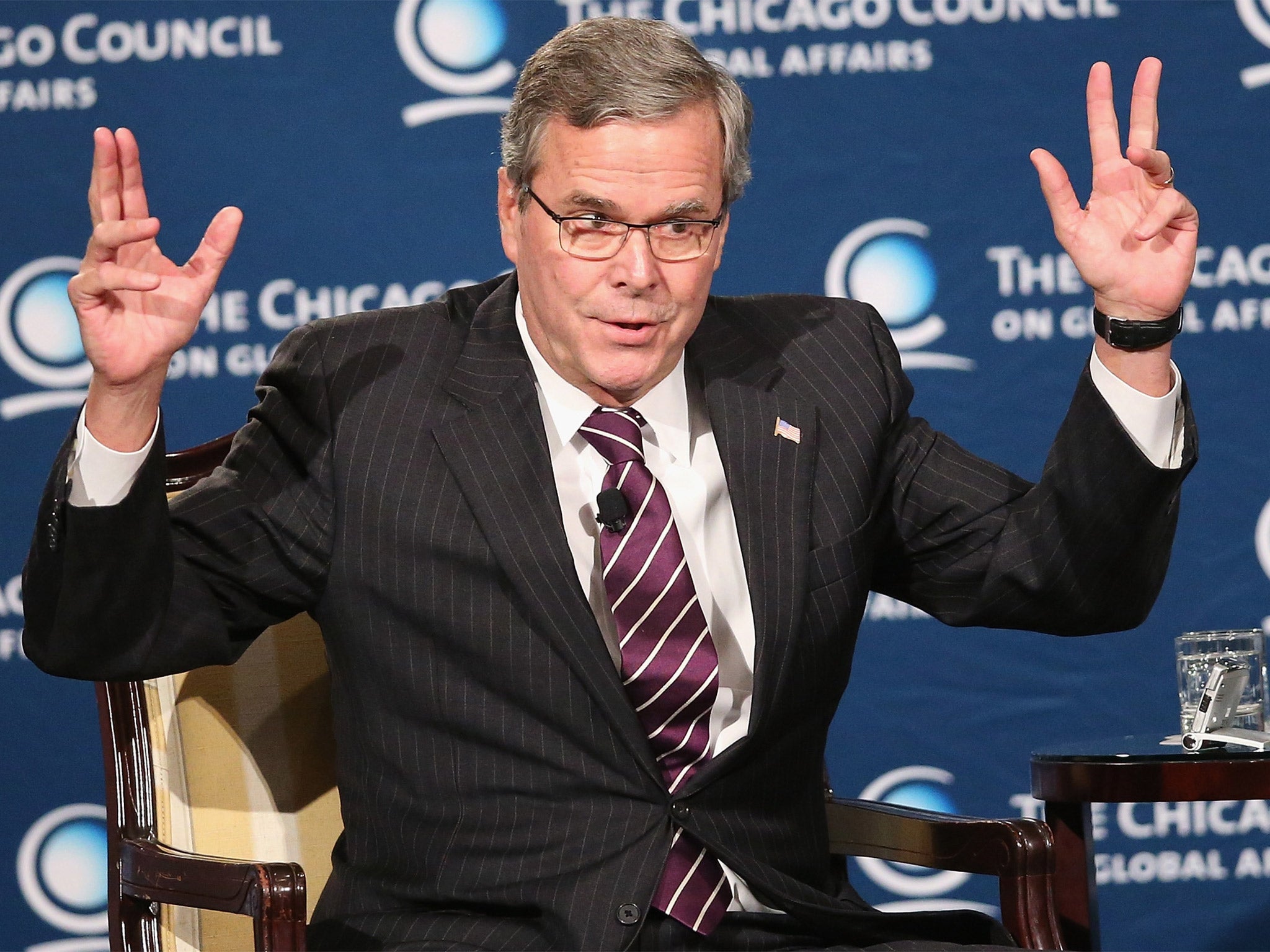Jeb Bush claims 'I'm my own man', but he has a very familiar foreign policy team
His brain trust is composed almost entirely of former advisers to his father and brother when they were president

Your support helps us to tell the story
From reproductive rights to climate change to Big Tech, The Independent is on the ground when the story is developing. Whether it's investigating the financials of Elon Musk's pro-Trump PAC or producing our latest documentary, 'The A Word', which shines a light on the American women fighting for reproductive rights, we know how important it is to parse out the facts from the messaging.
At such a critical moment in US history, we need reporters on the ground. Your donation allows us to keep sending journalists to speak to both sides of the story.
The Independent is trusted by Americans across the entire political spectrum. And unlike many other quality news outlets, we choose not to lock Americans out of our reporting and analysis with paywalls. We believe quality journalism should be available to everyone, paid for by those who can afford it.
Your support makes all the difference.In his first major foreign policy speech since mooting a 2016 presidential run, Jeb Bush sought to distance himself from the legacy of his brother, admitting mistakes were made in Iraq, and called for the world to “take out” Isis.
Noting the inevitable comparisons between himself and presidents George HW and George W Bush, the former governor of Florida said: “I love my father and my brother. I admire their service to the nation and the difficult decisions they had to make. But I am my own man – and my views are shaped by my own thinking.”
He has previously backed the Iraq War but today he admitted that “there were mistakes made in Iraq for sure”. However, he credited his brother with sending a surge of troops that helped quell the insurgency at the time.
Mr Bush made the remarks at an event hosted by non-partisan think-tank the Chicago Council on Global Affairs. He was “lucky”, he said, to have a father and brother who both “shaped America’s foreign policy”. But, he went on, “every president inherits a changing world… and changing circumstances”.
But while Mr Bush may claim that his foreign policy views differ from those of his family members, his brain trust is composed almost entirely of former advisers to his father and brother.
Perhaps the most controversial name on Mr Bush’s team sheet is Paul Wolfowitz, who worked for Reagan and for both Bush administrations, and who, as George W Bush’s deputy defence secretary, was a leading advocate for the invasion of Iraq.
Among other foreign policy and diplomatic experts in the Bush camp are two former secretaries of state who served under George HW Bush; two former secretaries of homeland security and two former CIA directors who served under George W Bush; George W Bush’s former national security adviser Stephen Hadley, and his deputy, Meghan O’Sullivan.
Foreign policy will be a key issue for any Republican presidential candidate, not least because the nominee seems likely to face former Secretary of State Hillary Clinton in the race for the White House. Under President Obama – and by extension Ms Clinton – Mr Bush said, “we have lost the trust and the confidence of our friends. We definitely no longer inspire fear in our enemies.”
The 62-year-old criticised the current administration for failing to cultivate stronger ties with its allies in Europe, Asia and Latin America, saying: “The great irony of the Obama Presidency is this: someone who came to office promising greater engagement with the world has left America less influential.”
His comments come as the US faces an array of foreign policy crises, including rising tensions with Russia over Ukraine, and the threat of Isis in the Middle East. Mr Bush blamed Mr Obama for the recent decline of US influence in the region. “I believe, fundamentally, that weakness invites war, and strength encourages peace,” he said.
He dismissed the idea of the US entering into diplomacy with Isis. “That’s just not going to work for terrorism,” he said. Instead there should be a global strategy that “takes them out”.
Mr Bush trumpeted his travel experience, noting that he has visited Israel five times. The current Israeli leader, Benjamin Netanyahu, is expected to address the US Congress on 3 March, against the wishes of the White House. “I, for one, am eager to hear what he has to say,” Mr Bush said.
He also singled out the Obama administration’s approach to talks with Iran, suggesting the White House intended to simply “manage” the Iranian nuclear threat.
Subscribe to Independent Premium to bookmark this article
Want to bookmark your favourite articles and stories to read or reference later? Start your Independent Premium subscription today.
Join our commenting forum
Join thought-provoking conversations, follow other Independent readers and see their replies
Comments